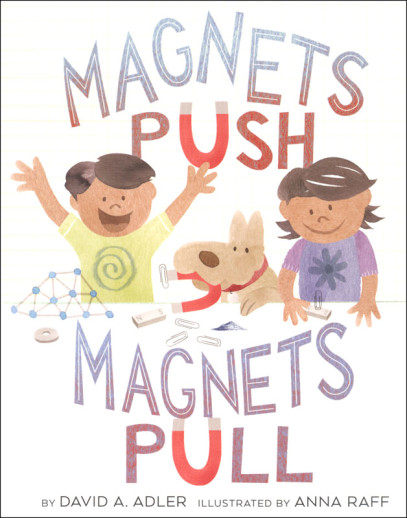We use cookies to make your experience better. To comply with the new e-Privacy directive, we need to ask for your consent to set the cookies. Learn more.
Magnets Push, Magnets Pull
Magnetism is explained in an understandable format in this easy-to-read children’s book. As concepts are discussed, there are simple hands-on experiments to help children comprehend what they are reading. The fun illustrations provide a visual component for kids to further acknowledge the learning. Children learn about kinds of magnets, what magnets stick to, magnetic fields, magnet poles, and how to make a magnet.
Explore the fascinating field of magnetism with this interactive picture book for young learners.
Magnetism is all around us–even the earth is a giant magnet. A world without magnets would be a world without cell phones, computers, and more!
Trusted children’s nonfiction author David A. Adler covers the basics of magnetism, including compasses, for aspiring scientists. Hands-on experiments are smartly woven into the narrative. Want to test out the strength of a magnet? All you need is a bowl of water and some paper clips!
Anna Raff’s lively art illustrates scientific concepts clearly, with the added fun of two siblings and their dog exploring and learning together. Back matter includes a glossary that defines such terms as attraction, pole, electromagnetism, force, and more. Suggested activities on how to make your own magnet are also included.
This picture book series uses simple, hands-on activities to help children understand scientific concepts of gravity, magnetism, light waves, simple machines, floatation and density. Adler's writing creates clarity regarding what might be a difficult concept for some children. He talks to the reader to draw them in by connecting to their everyday experiences. Lively art illustrates scientific concepts clearly with the added fun of two children learning together.
| Product Format: | Paperback |
|---|---|
| Brand: | Holiday House |
| Grades: | K-3 |
| ISBN: | 9780823440184 |
| Length in Inches: | 11 |
| Width in Inches: | 8.625 |
| Height in Inches: | 0.125 |
| Weight in Pounds: | 0.35 |

